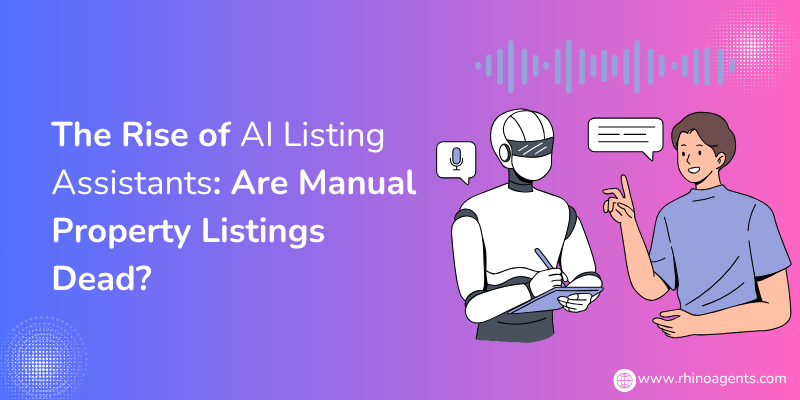In the fast-evolving world of real estate, artificial intelligence is no longer a future possibility; it’s the present. Among the most transformative tools changing the game for realtors, brokers, and property managers are AI listing assistants. These intelligent platforms are automating everything from writing property descriptions to pushing listings across platforms with just a few clicks.
Once a tedious yet unavoidable task for agents, manual property listings are rapidly becoming outdated. In today’s competitive market, speed, precision, and presentation are everything, and AI delivers on all fronts. According to a Survey, over 61% of real estate professionals have either already adopted or plan to implement AI-based solutions into their operations by 2026, with listing automation topping the priority list.
So, what exactly are AI listing assistants, and are they truly replacing traditional ways of managing property listings? Let’s explore the details.
What Are AI Listing Assistants?
AI listing assistants are advanced software tools that use machine learning, natural language processing (NLP), image recognition, and automation to handle the once-manual real estate listing process. These tools are integrated into real estate CRMs, listing platforms, and PropTech tools to support tasks such as:
- Writing property descriptions automatically
- Enhancing and labeling property photos
- Suggesting optimal listing prices based on current market trends
- Pushing listings across multiple real estate websites
- Ensuring listings are SEO-optimized and compliant
Examples of widely used AI tools in real estate include Restb.ai, Zillow’s Listing Insights, Rex, Rechat, and EyeSpy360. These platforms enable real estate professionals to shift their time from manual input to more value-added activities like client communication and negotiations.
The Problem with Manual Property Listings
Manual listing methods are quickly becoming outdated in today’s fast-paced real estate market. They slow down workflows and leave room for costly mistakes.
Key issues include:
- Missing or outdated data that reduces buyer trust.
- Time-heavy process, taking hours each week from agents.
- Weak, unoptimized descriptions that don’t drive engagement.
- Frequent human errors, like typos and mispricing.
- Lower visibility on major platforms due to poor formatting.
In a digital-first era, these inefficiencies can mean lost leads, slower sales, and lower revenue.
How AI Listing Assistants Solve These Challenges?
The introduction of AI into the real estate listing process brings an unprecedented level of automation, consistency, and speed. Here’s how AI listing assistants are changing the game:
1. Instant Multi-Platform Syndication
With AI-enabled tools, agents can upload property details once, and the platform will format and publish the listing across all major portals, websites, and social media channels in real time. This drastically reduces duplication of effort and ensures a consistent brand voice across channels.
2. AI-Generated Descriptions That Sell
Tools like ReimagineHome and Zillow AI use NLP to automatically analyze property features, location trends, and buyer preferences to generate engaging SEO-optimized descriptions. These AI-written descriptions often outperform human-written ones regarding clarity and keyword performance.
AI-written real estate content had 13% higher click-through rates (CTR) than manually written content.
3. Smart Pricing Recommendations
To suggest ideal listing prices, AI listing assistants use predictive analytics to compare real-time market trends, recent comparable sales (comps), and buyer behavior data. This reduces the risk of overpricing or underpricing, which can deter buyers or hurt profitability.
For example, HouseCanary, a data-powered valuation tool, reports that properties priced using AI had 22% fewer days on the market than manually priced ones.
4. Enhanced Visuals with AI Image Processing
Platforms like Restb.ai use computer vision to tag property features (e.g., granite countertops and hardwood floors) in photos and auto-enhance images for brightness and clarity. AI tools also ensure listing photos are ADA-compliant with ALT tags and optimized for Google Image search.
5. Error Prevention and Compliance
AI listing tools help catch missing fields, outdated information, or violations of fair housing rules before listings go live. This reduces compliance risks and helps agents maintain a professional, trustworthy image.
Industry Outlook: Is Manual Listing Dead?
While AI won’t eliminate manual involvement, it’s rapidly taking over the heavy lifting. According to the Report, 90% of real estate companies say they expect AI to handle at least half of their listing tasks by 2026.
However, agents still play a critical role in verifying listing accuracy, adding emotional appeal, and providing personalized client communication. AI amplifies agent efficiency, not replaces it.
Conclusion:
The rise of AI listing assistants is no passing trend—it’s a tectonic shift in real estate. These tools are helping agents list smarter, faster, and more effectively, offering a massive competitive edge in a digital-first market.
While manual listing practices aren’t dead yet, they quickly become less relevant. Agents who fail to adopt AI solutions risk falling behind, while those who embrace them are poised to lead the next era of real estate innovation.
About Rhino Agents
“Manual listings are holding agents back. RhinoAgents’ advanced AI not only automates property descriptions and image enhancement but also ensures your listings go live across major platforms instantly, with SEO precision and zero errors.”


